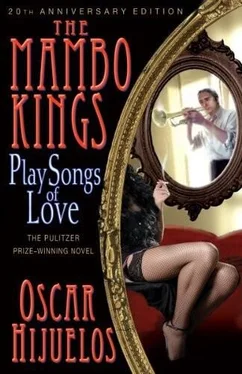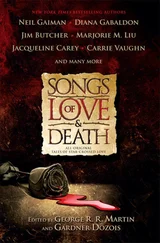Tired of singing with the Havana Melody Boys, Cesar Castillo wanted to put together an orchestra of his own. Coming from a small town in Oriente, he had been inspired by the stories he’d heard about Cubans who’d left for the States. A woman from Holguín had become an actress and gone to Hollywood, where she had gotten rich making films with George Raft and Cesar Romero. (Raft appeared as an Argentine gaucho in a jingle-bell-rimmed gaucho’s hat, performing the tango with this woman in a film called Passion on the Pampas.) She made enough money to live in a radiant pink mansion in a place called Beverly Hills; and there was another fellow, a rumba dancer named Ernesto Precioso, whom Cesar had known from the dance halls of Santiago de Cuba and who had been discovered by Xavier Cugat, for whom he’d starred as a featured dancer in a Hollywood short with Cugat called The Lady in Red and with the pianist Noro Morales in The Latin from Staten Island.
Others who’d done well? Alberto Socarrás playing in a nightclub called the Kubanacan in Harlem, Miguelito Valdez (the Magnificent) crooning away for Xavier Cugat at the McAlpin Hotel, Machito with his widespread New York popularity and his European tours. Tito Rodríguez at the Palm Nightclub, and the Pozo Brothers.
But the most famous success story would be that of a fellow crooner whom the brothers knew from Santiago de Cuba, where they sometimes performed in dance halls and in the placitas, sitting out under the moonlight, strumming guitars. Desi Arnaz. He had turned up in the States in the thirties and established himself in the clubs and dance halls of New York as a nice, decent fellow and had parlayed his conga drum, singing voice, and quaint Cuban accent into fame. And there were others: Cesar Romero and Gilbert Roland, Latin chaps who’d made it in the movies playing nightclub gigolos and gun-toting, sombrero-pated, spur-booted vaqueros. Cesar was impressed by Arnaz’s success and sometimes daydreamed of achieving that fame (he laughs now). That Cesar was white like Arnaz (though to some Americans he would be “a Spic”) and had a good quivering baritone and blunt pretty-boy looks all seemed destined to work to his advantage.
In any case, the scene might be better in New York. Musician friends from Havana traveled north and found work in the orchestras of people like Cugat, Machito, Morales, and Arnaz. Cesar heard rumors and received letters about money, dance halls, recording contracts, good weekly salaries, women, and friendly Cubans everywhere. He figured that if he went up there he could stay with Cousin Pablito, hook up with an orchestra, get away from trouble, make some money. And who could say what else might happen for them.
The day the brothers arrived in New York, fresh from Havana, in January of 1949, the city was covered in two feet of snow. Flying out of Havana on a Pan Am Clipper to Miami for $39.18, they then took the Florida Special north. In Baltimore they began to encounter snow, and while passing through a station in northern Maryland, they came across a water tower that had burst and blossomed into an orchid-shaped, many-petaled cascade of ice. Pablo met them at Pennsylvania Station, and, hombre, the brothers in their thin-soled shoes and cheap Sears, Roebuck overcoats were chilled to the bone. On the streets, people and cars seemed to disappear in the snowy winds like shredding phantoms. (They dissolved in a snow that wasn’t anything like the snow they’d seen in the movies in Havana, nothing like Bing Crosby’s angelic “I’m Dreaming of a White Christmas” snow, or the snow they’d imagined in dreams, lukewarm like the fake frost on a movie hous e Air-Conditioned sign.) Their thin-soled Cuban shoes soaked through, and when they stomped their feet in Pablo’s lobby, they could smell the fumes of gas and electric heaters in the halls.
Pablo and his family lived at 500 La Salle, west of 124th Street and Broadway, in uptown Manhattan. It was a six-story tenement, constructed around the turn of the century to house the servant class, and it had a simple stoop with black curlicue railings, a narrow doorway framed in a crenellated brick archway. Above this rose six floors of black wrought-iron fire escapes and lamplit Venetian-blinded windows. It was two minutes from the 125th Street El, an overnight train ride and forty-five-minute flight from Havana, and five minutes from Harlem, the heartland of syncopating rhythm, as they used to say in those days. From its roof you could see the Hudson River and the domed and pillared mausoleum that was Grant’s Tomb toward the northern edge of Riverside Park at 122nd Street and all the way over to the docks, and the lines of commuters and cars waiting to board the ferryboats for New Jersey.
That same night, Pablo’s wife cooked them a great feast, and because it had been snowing and their feet were cold, she washed their numb toes in a pan of hot water. She was a practical and kindhearted woman from Oriente, for whom marriage and childbearing were the great events in her life. She lived to take care of the men in that house, slaved washing their clothes, cleaning the house, cooking, and attending to the children. Those first cold days, the future Mambo King spent most of his time in the kitchen drinking beer and watching her prepare big pots of stew and rice and beans and fried plátanos. Frying up steaks and pork chops and long strings of sausages that Pablito would bring home from his foreman’s job at the meat plant. The smoke would escape out the windows, and neighbors, like their landlady, Mrs. Shannon, would shake their heads. Pablo’s wife would cook breakfast, fried chorizos and eggs, and then iron their clothes. She sighed a lot, but immediately after sighing, she smiled, a statement of fortitude; her plump, dimpled face highlighted by long, long eyelashes whose shadows were like the hands of a clock. That was what she was like, a clock, marking her day with her chores, her sighs punctuating the hours.
“A family and love,” he heard again. “That’s what makes a man happy, not just playing the mambo.”
And in those days Pablo would drive them around in his Oldsmobile to see the sights, or the brothers would ride the subway all over the four boroughs, faces pressed against the windows, as if counting the pillars and flashing lights for fun. Cesar favored amusement parks, circuses, movie houses, burlesques, and baseball games, while Nestor, a more quiet, docile, and tormented man, enjoyed nature and liked going to the places that Pablo’s children loved the most. He liked to take the children to the Museum of Natural History, where he would revel in walking among the remains of so many reptiles, mammals, birds, fish, insects which had once vibrated, shimmered, crawled, flown, swum through the world and which were now preserved in row after row of glass cases. On one of those days, he, Cesar, Pablo, and the kids posed proudly for a photograph before the looming skeleton of Tyrannosaurus Rex. Afterwards they walked over to Central Park, the brothers strolling together as they used to down in Havana. Back then it was tranquil and clean. Old ladies sunned themselves everywhere and young men snuggled in the grass with their girls. Picnicking on the green, they ate thick steak heroes and drank Coca-Colas, enjoying the sunshine as they watched boats float across the lake. Best was the Bronx Zoo in springtime, with its lions prowling in their dens, the buffalo with their great horns and downy fur foaming like whitewater beneath their chins, long-necked giraffes whose heads curiously peeked high into the skirts of trees. Beautiful days, beyond all pain, all suffering.
At this time in New York there was a bit of malevolent prejudice in the air, postwar xenophobia, and budding juvenile delinquency on the streets. (And now? Years later? A few of the Irish old-timers stubbornly hanging on can’t believe what happened on their street, the sidewalks jammed now with dominoes, shell games, card players, and radios and fruit-ice wagons, those old fellows wandering about furtively like ghosts.) Cesar would remember being shushed on the street for speaking to Nestor in Spanish, having eggs thrown at him from a rooftop as he marched up the hill to Pablito’s in a flamingo-pink suit. They learned which streets to avoid, and not to go walking along the docks at night. And while they found this part of life in New York depressing at first, they took solace in the warmth of Pablo’s household: the music of Pablo’s record player, the aroma of cooking plantains, the affection and kisses from Pablo’s wife and his three children made them happier.
Читать дальше












